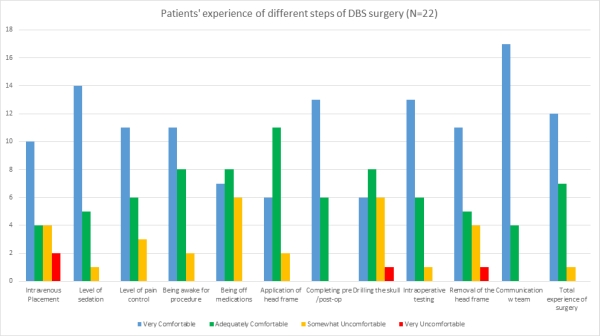Session Information
Date: Monday, June 20, 2016
Session Title: Surgical therapy: Parkinson's disease
Session Time: 12:30pm-2:00pm
Location: Exhibit Hall located in Hall B, Level 2
Objective: To evaluate experience of patients who undergo Deep Brain Stimulation (DBS) surgery for treatment of different movement disorders, using patient survey questionnaires.
Background: DBS surgically treats symptoms of several movement disorders including Parkinson’s disease, essential tremor, dystonia, and Tourette syndrome. The coordinated effort of several providers before, during and after surgery shapes patients’ experience and comfort especially considering that patients remain conscious during the surgery. A hallmark of modern health care is the emphasis on patient experience alongside surgical outcomes, and this is the main focus of the current study.
Methods: Shortly after DBS surgery and battery placement, we surveyed different movement disorders patients. Using questionnaires, 22 patients rated their experience of pre-surgical (care coordination, neuropsychological testing, MRI imaging and medical clearance), surgical (sedation and different steps of surgery), and post-surgical care (stays in NSICU and discharge coordination). The study is ongoing and we intend to survey a total of 50 patients.
Results: Median age of patients was 67 years old, 14 were male and 8 female, and more than half had a major surgery before. 82% of patients were very satisfied with pre-surgical care, compared to 60% with surgical and 76% with post-surgical care. During surgery, withholding of Parkinsonian medications, application of head frame, drilling of the skull, and IV placement all strongly contributed to patients’ discomforts (see Figure 1). Only 14% felt the procedure took longer than they expected. All patients felt they received adequate information before discharge. 15 out of 18 patients responded they would go through the surgery again. 
Conclusions: Our study shows that DBS is a well-tolerated procedure. A high majority of patients were satisfied with all stages of surgery. Being off of Parkinson medications adversely affected patients’ experiences. The most uncomfortable steps during surgery were head frame placement and drilling of the skull, as well as placing the IV needle.
To cite this abstract in AMA style:
A. Fazl, M. Gillego, A. Mogliner, M.H. Pourfar. How do patients experience deep brain stimulation surgery: A prospective patient satisfaction survey [abstract]. Mov Disord. 2016; 31 (suppl 2). https://www.mdsabstracts.org/abstract/how-do-patients-experience-deep-brain-stimulation-surgery-a-prospective-patient-satisfaction-survey/. Accessed April 20, 2025.« Back to 2016 International Congress
MDS Abstracts - https://www.mdsabstracts.org/abstract/how-do-patients-experience-deep-brain-stimulation-surgery-a-prospective-patient-satisfaction-survey/
